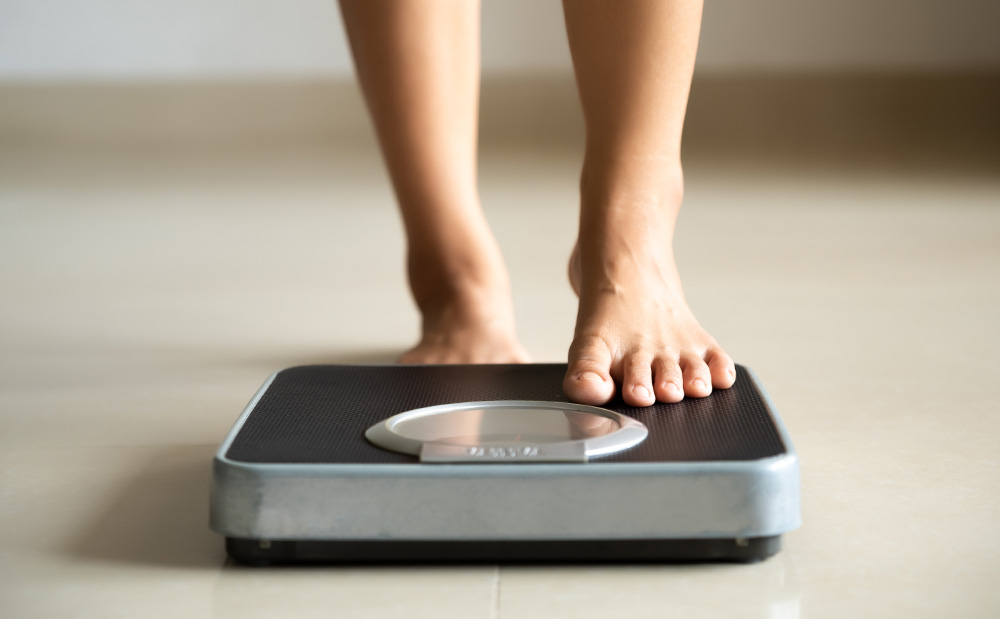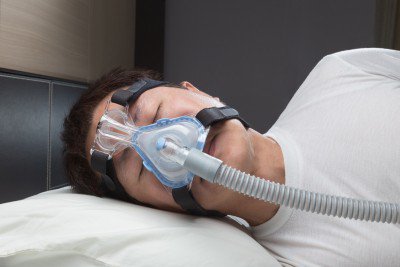
When you have obstructive sleep apnea, your breathing pauses throughout the night while you sleep. (1) Sleep apnea comes in two types: central and obstructive. Unlike central sleep apnea, which comes from disrupted brain signals, obstructive sleep apnea (OSA) arises when something like your tongue or neck position blocks your airway. (2) When we say “sleep apnea” in this article, we are talking about the obstructive type.
Affecting almost 40 percent of adults, obstructive sleep apnea wins the prize for most common sleep-related breathing disorder. (3) (4) Out of that group, just about 60 percent of moderate-to-severe OSA cases come from carrying too much body weight, making obesity a top risk factor for this sleep disorder. (3) (4)
Below, we’ll discuss how excess weight can cause sleep apnea, how OSA can lead to weight gain, and if losing weight can cure your sleep apnea.
Note: The content on Sleepopolis is meant to be informative in nature, but it shouldn’t be taken as medical advice, and it shouldn’t take the place of medical advice and supervision from a trained professional. If you feel you may be suffering from any sleep disorder or medical condition, please see your healthcare provider immediately.
Long Story Short
- A higher weight can raise your risk for obstructive sleep apnea because of excess tissue in the neck, chest, and tongue.
- Sleep apnea can contribute to weight gain by disrupting hunger hormones, sleep, and metabolism.
- Left untreated, sleep apnea can affect your cardiovascular system and increase your risk for diabetes.
- Treating your sleep apnea can help you shed some pounds, and vice versa.
How Extra Weight Worsens Sleep Apnea Symptoms
Body weight holds a lot of sway in obstructive sleep apnea’s development and severity, but other factors also play a role. (3) “The relationship between sleep apnea and weight gain is supported by substantial research, though the exact mechanisms continue to be studied,” says Dr. Chester Wu, MD, sleep medicine physician in Houston, TX.
If weight and sleep apnea are so intertwined, how much extra weight qualifies as too much? Studies show the answer lies not just in the number on your scale, but in a combination of factors. For example, a higher BMI (body mass index) and wider waistline can mean an increased risk for sleep apnea. (6) But how?
When we gain weight, we don’t just get love handles. Fat can collect in some surprising places, like your tongue, neck, and chest. (3) (7)
Narrow Airway
When you carry extra weight, some of that fat can end up around your airway (the tube from your mouth to your lungs) which can keep it from expanding fully. Then, when you relax during sleep, the extra ounces around your neck can push on that tube and close it off for a moment or two. (3)
Some studies suggest that extra weight might affect the airway’s size and propensity to collapse, but this is an area of ongoing research. (8)
Large Tongue
Believe it or not, your tongue grows and shrinks with your waistline — not a ton, of course, but enough to block off a little more of your airway when you sleep. (7) (8)
Tight Chest
When fat gathers around your chest, you can’t breathe quite as deeply as before. (3) When your lungs can’t take in as much air, you don’t get the oxygen you need. (9)
These causes can fade with weight loss, but more on that later.
Can Sleep Apnea Cause Weight Gain?
Sleep apnea and weight gain can sometimes feed off of each other. As you’ve just read, weight gain increases your risk for sleep apnea and may exacerbate symptoms. But sleep apnea can also promote added pounds in a couple of different ways, says Wu.
Hormones
When you don’t get enough quality sleep, hunger hormones like leptin and ghrelin can get out of sync and affect your appetite. (10) “As a result,” says Wu, “individuals with OSA may experience increased appetite and cravings for high-calorie foods.”
Sleep apnea can also mess with another hormone: insulin. With or without sleep deprivation, OSA can cause insulin resistance, says Wu. Insulin resistance can promote weight gain and pave the way for type 2 diabetes. (11)
Fatigue = Less Exercise
Even with the best-laid plans, a fantastic gym membership, and good intentions, a poor night’s sleep may stop any physical activity in its tracks. Sleep apnea can easily leave you feeling extra tired, which often leads to less exercise. The less you move your body, the more calories you hang on to. This combination can easily promote weight gain, says Wu.
Metabolism Shift
Your metabolism plays a big role in how you gain and lose weight. (12) When you miss out on sleep because of sleep apnea, your metabolism can slow down, making it more challenging to lose weight. (13)
First, let’s look at the physical effects of a higher weight and sleep apnea. Then we’ll get into what you can do to get better sleep and improve your sleep apnea symptoms.
The Side Effects of Sleep Apnea and Obesity
When sleep apnea and obesity get together, they can cause quite a fuss in your body. Each comes with its own health risks, but plenty of them overlap. (10)
Cardiovascular Health
Your weight and sleep apnea especially impact your cardiovascular system: your heart and blood vessels. The “why” behind some of these connections remains a mystery, but research has showed some distinct correlations between sleep apnea, weight, and the following health conditions:
- Hypertension: More commonly known as high blood pressure, hypertension can disturb organs like your heart, brain, eyes, and kidneys. (14) (15)
- Coronary artery disease: Coronary artery disease is associated with factors like cholesterol imbalance and can increase the risk of heart disease and strokes. (16) (17) (18)
- Heart failure: When you have heart failure, your heart doesn’t pump as well as it needs to. (19) Both obesity and sleep apnea may increase your risk of readmission after you come home from a heart failure related hospital stay. (20) (21)
Sleep apnea treatment and weight loss may lessen your risk of dealing with these health issues. (21) (17)
Type 2 Diabetes
Extra weight is a well-known risk factor for type 2 diabetes. (22) Sleep apnea’s link to diabetes, however, may not be common knowledge.
When sleep apnea closes your airway throughout the night, your body goes into high gear to get you breathing again. This response can release brain chemicals called catecholamines, such as epinephrine and norepinephrine. These stress messengers can raise your blood sugar and make it more difficult to control your type 2 diabetes. (10)
Obesity Hypoventilation Syndrome
When you breathe, you take in oxygen and exhale carbon dioxide. Obesity hypoventilation syndrome, also known as Pickwickian syndrome, makes you hang on to some of that carbon dioxide and prevents you from getting enough oxygen. This breathing disorder can be common for people who have a high BMI and sleep apnea together and often respond to the same treatments. (23)
Can Losing Weight Cure Sleep Apnea?
Losing weight can significantly improve sleep apnea symptoms for some people, but it may not necessarily cure it. (5) When you have sleep apnea, losing weight can feel challenging, says Wu, but its benefits are well worth it.
Remember, extra tissue in your neck, chest, and tongue can block your airway and as you lose weight, those areas get less crowded. The American Thoracic Society says losing as little as five to 10 percent of your body weight can make a big difference. (24) Using this math, if you weigh 250 pounds, shedding just over 12 of those lbs (five percent) could have you breathing better at night.
Weight Loss Tips with Sleep Apnea
Weight loss can feel intimidating, but we’ve got you covered! Wu recommends a balanced diet and regular exercise to improve your sleep apnea symptoms. But what does that look like? Take a look at these tips to get you started and keep you on track. (25)
- Keep a food diary: Write down what you eat and drink for a few days to a week. This simple technique can keep you from mindless munching.
- Track your physical activity: Whether through an app on your phone or pen and paper, make exercise goals and then record your missteps and successes.
- Eat Mindfully: As a child, a parent may have scolded you if you didn’t finish your plate. Now, experts say it’s better to pay attention to your body and stop eating if you feel full. (26)
- Try not to over-commit: When you’re excited about starting down this path, you may swear up and down you’ll run a marathon every day. Set yourself up for success with small goals. You can always increase them later!
Recently, new weight loss medications called GLP-1 receptor agonists have taken center stage in the world of weight management and diabetes, says Wu. For sleep apnea treatment, Wu adds, they show promise alongside lifestyle changes; however, we need to see more research to understand their role better.
Weight loss surgery can also help reduce your weight and may improve your sleep apnea symptoms. (27) You can check your eligibility for this option with your healthcare provider.
Does Treating Sleep Apnea Help with Weight Loss?
As your sleep apnea improves, you’ll get better sleep and have more energy, which paves the way for more physical activity and weight loss. (28)
Some people lose weight on CPAP (continuous positive airway pressure) treatment. For others, their weight stays the same or even increases. (29) One small study of 149 patients found the more often they used their CPAP, the more they gained weight. (30) But another larger study found that patients who used their CPAP for over five hours gained less weight than those who used it for less than five hours. (31)
“Interestingly, the impact of CPAP on weight may vary by gender and obesity status,” says Wu. “Some studies have found that women and obese individuals may experience an increase in BMI after a year of CPAP use, while men and non-obese individuals do not show significant changes.”
In the end, it looks like the jury’s still out. Either way, says Wu, treating your sleep apnea is important regardless of weight loss results.
The Importance of Early Intervention
Childhood obesity is a growing problem in the United States, affecting almost one out of every five children. (23) Obesity increases the risk of sleep apnea in all children, but especially in teens. (32) In the general population, only one to six percent of kids have sleep apnea, but this number shoots up to 60 percent in children with obesity. (33)
When you treat obesity and sleep apnea in children, you can increase quality of life, improve behavior and brain function, and ensure they grow and develop on a healthy track. (33)
Alternate Sleep Apnea Treatments
Beyond hitting the treadmill and counting your calories, your provider may recommend alternate sleep apnea treatments like CPAP. This device includes a mask, face straps, and clear tubes connected to the CPAP machine. (34)
CPAP adds some pressure to your airway throughout the night to keep it from collapsing. A CPAP can take a little getting used to, but many report feeling more rested and energetic after getting the hang of it — sometimes it just takes patience as you adjust to sleeping with a new device you aren’t used to. (4)4 (34)
Does CPAP make you gain weight?
Some people lose weight on CPAP treatment, while for others, their weight stays the same or even increases. (29) You may not know how CPAP will affect your weight until you try it, but treating your sleep apnea is important regardless of weight loss results, says Wu.
Does sleep apnea cause belly fat?
When you have sleep apnea, your appetite-controlling hunger hormones can get imbalanced, leading you to eat more than you need and to crave high-calorie foods. (10) Sleep apnea can easily leave you feeling extra tired, which often leads to less exercise. (35)
The less you move your body, the more calories you hang on to. This combination can easily promote weight gain, says Wu. Sleep apnea may contribute to weight gain, including an increase in belly fat, due to hormonal imbalances and reduced physical activity.
The Last Word From Sleepopolis
If you live with sleep apnea and are storing some extra pounds on your frame, know that you have a lot of options to improve your symptoms. Weight and sleep apnea affect one another, but as you tackle one issue, it can help diminish the other. You can try some weight loss tips, but don’t forget to keep your healthcare provider up to date on how you feel.
Sources
- Sleep Apnea – What Is Sleep Apnea? | NHLBI, NIH. Accessed November 20, 2024. https://www.nhlbi.nih.gov/health/sleep-apnea
- Sleep Apnea – Causes and Risk Factors | NHLBI, NIH. Accessed September 14, 2024. https://www.nhlbi.nih.gov/health/sleep-apnea/causes
- Hsing SC, Chen CC, Huang SH, et al. Obese patients experience more severe OSA than non-obese patients. Medicine. 2022;101(41):e31039. doi:10.1097/MD.0000000000031039
- Carneiro-Barrera A, Amaro-Gahete FJ, Díaz-Román A, et al. Interdisciplinary Weight Loss and Lifestyle Intervention for Obstructive Sleep Apnoea in Adults: Rationale, Design and Methodology of the INTERAPNEA Study. Nutrients. 2019;11(9):2227. doi:10.3390/nu11092227
- St-Onge MP, Tasali E. Weight Loss Is Integral to Obstructive Sleep Apnea Management. Ten-Year Follow-up in Sleep AHEAD. Am J Respir Crit Care Med. 2021;203(2):161-162. doi:10.1164/rccm.202007-2906ED
- Vana KD, Silva GE, Carreon JD, Quan SF. Using anthropometric measures to screen for obstructive sleep apnea in the Sleep Heart Health Study cohort. Journal of Clinical Sleep Medicine. 17(8):1635-1643. doi:10.5664/jcsm.9268
- Wang SH, Keenan BT, Wiemken A, et al. Effect of Weight Loss on Upper Airway Anatomy and the Apnea–Hypopnea Index. The Importance of Tongue Fat. Am J Respir Crit Care Med. 2020;201(6):718-727. doi:10.1164/rccm.201903-0692OC
- Lin H, Xiong H, Ji C, et al. Upper airway lengthening caused by weight increase in obstructive sleep apnea patients. Respiratory Research. 2020;21(1):272. doi:10.1186/s12931-020-01532-8
- Lo Mauro A, Tringali G, Codecasa F, Abbruzzese L, Sartorio A, Aliverti A. Pulmonary and chest wall function in obese adults. Sci Rep. 2024;13(1):17753. doi:10.1038/s41598-023-44222-3
- Kurnool S, McCowen KC, Bernstein NA, Malhotra A. Sleep Apnea, Obesity, and Diabetes — an Intertwined Trio. Curr Diab Rep. 2024;23(7):165-171. doi:10.1007/s11892-023-01510-6
- CDC. The Insulin Resistance–Diabetes Connection. Centers for Disease Control and Prevention. Published June 20, 2022. Accessed November 24, 2024. https://www.cdc.gov/diabetes/basics/insulin-resistance.html
- Metabolic Consequences of Weight Reduction – StatPearls – NCBI Bookshelf. Accessed November 24, 2024. https://www.ncbi.nlm.nih.gov/books/NBK572145/
- Papatriantafyllou E, Efthymiou D, Zoumbaneas E, Popescu CA, Vassilopoulou E. Sleep Deprivation: Effects on Weight Loss and Weight Loss Maintenance. Nutrients. 2022;14(8):1549. doi:10.3390/nu14081549
- High Blood Pressure Symptoms and Causes | cdc.gov. Accessed November 24, 2024. https://www.cdc.gov/bloodpressure/about.htm
- Xia Y, Liang C, Kang J, You K, Xiong Y. Obstructive Sleep Apnea and Obesity Are Associated with Hypertension in a Particular Pattern: A Retrospective Study. Healthcare. 2024;11(3):402. doi:10.3390/healthcare11030402
- Atherosclerosis and Stroke | American Stroke Association. Accessed November 24, 2024. https://www.stroke.org/en/about-stroke/stroke-risk-factors/atherosclerosis-and-stroke
- Lau HL, Rundek T, Ramos AR. Sleep and Stroke: New Updates on Epidemiology, Pathophysiology, Assessment, and Treatment. Curr Sleep Medicine Rep. 2019;5(2):71-82. doi:10.1007/s40675-019-00142-1
- Patial K, Mishra HP, Pal G, et al. Understanding the Association Between Obesity and Obstructive Sleep Apnea Syndrome: A Case-Control Study. Cureus. Published online September 24, 2024. doi:10.7759/cureus.45843
- What is Heart Failure? | American Heart Association. Accessed November 21, 2024. https://www.heart.org/en/health-topics/heart-failure/what-is-heart-failure
- Mughal MS, Ghani AR, Kumar S, et al. Heart Failure Patients and Implications of Obesity: A Single-Center Retrospective Study. Cureus. Published online September 20, 2021. doi:10.7759/cureus.18140
- Javaheri S, Javaheri S. Obstructive Sleep Apnea in Heart Failure: Current Knowledge and Future Directions. Journal of Clinical Medicine. 2022;11(12):3458. doi:10.3390/jcm11123458
- CDC. What Causes Type 2 Diabetes. Centers for Disease Control and Prevention. Published July 28, 2022. Accessed November 21, 2024. https://www.cdc.gov/diabetes/library/features/diabetes-causes.html
- Overweight and Obesity – Obesity Hypoventilation Syndrome | NHLBI, NIH. Published March 24, 2022. Accessed November 21, 2024. https://www.nhlbi.nih.gov/health/obesity-hypoventilation-syndrome
- Coaker MA, Hudgel DavidW, Patel SR. Weight Loss and Sleep Apnea. Am J Respir Crit Care Med. 2020;201(3):P5-P6. doi:10.1164/rccm.2013P5
- Losing Weight | Healthy Weight, Nutrition, and Physical Activity | CDC. Accessed November 24, 2024. https://www.cdc.gov/healthyweight/losing_weight/index.html
- Avenue 677 Huntington, Boston, Ma 02115. Mindful Eating. The Nutrition Source. Published September 14, 2020. Accessed November 21, 2024. https://www.hsph.harvard.edu/nutritionsource/mindful-eating/
- Nastałek P, Polok K, Celejewska-Wójcik N, et al. Impact of bariatric surgery on obstructive sleep apnea severity and continuous positive airway pressure therapy compliance—prospective observational study. Sci Rep. 2021;11(1):5003. doi:10.1038/s41598-021-84570-6
- How Sleep Works – Why Is Sleep Important? | NHLBI, NIH. Accessed September 14, 2024. https://www.nhlbi.nih.gov/health/sleep/why-sleep-important
- Pocienė I, Gauronskaite R, Kogan J, Zablockis R, Danila E. Weight changes after initiation of CPAP in sleep apnea patients. European Respiratory Journal. 2019;54(suppl 63). doi:10.1183/13993003.congress-2019.PA4167
- Aro MM, Anttalainen U, Polo O, Saaresranta T. Mood, sleepiness, and weight gain after three years on CPAP therapy for sleep apnoea. European Clinical Respiratory Journal. 2021;8(1):1888394. doi:10.1080/20018525.2021.1888394
- Chen B, Drager LF, Peker Y, et al. Effect of Continuous Positive Airway Pressure on Weight and Local Adiposity in Adults with Obstructive Sleep Apnea: A Meta-Analysis. Annals ATS. 2021;18(10):1717-1727. doi:10.1513/AnnalsATS.202101-060OC
- Piotto M, Gambadauro A, Rocchi A, et al. Pediatric Sleep Respiratory Disorders: A Narrative Review of Epidemiology and Risk Factors. Children. 2024;10(6):955. doi:10.3390/children10060955
- Teplitzky TB, Zauher A, Isaiah A. Evaluation and diagnosis of pediatric obstructive sleep apnea—An update. Frontiers in Sleep. 2024;2. Accessed November 21, 2024. https://www.frontiersin.org/articles/10.3389/frsle.2023.1127784
- CPAP – CPAP | NHLBI, NIH. Published March 24, 2022. Accessed November 21, 2024. https://www.nhlbi.nih.gov/health/cpap
- Sleep Apnea – Symptoms | NHLBI, NIH. Accessed November 20, 2024. https://www.nhlbi.nih.gov/health/sleep-apnea/symptoms
Wu, Chester, MD. Personal interview. November 19, 2024.


